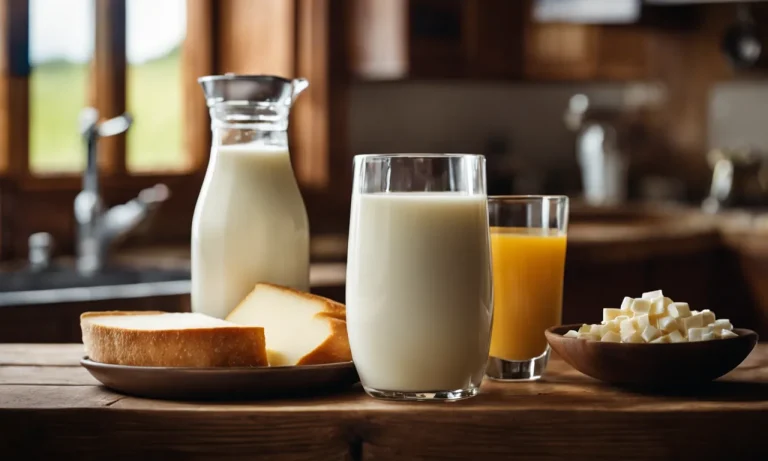Is Jack Daniel’S Vegan?
As more people adopt plant-based lifestyles, veganism extends beyond just food. Vegans also aim to avoid products connected to animal exploitation, including alcoholic beverages. This raises questions around one of America’s most iconic whiskies – is Jack Daniel’s vegan?
In this comprehensive guide, we’ll analyze the production process for Jack Daniel’s Tennessee Whiskey to determine if it aligns with vegan principles.
If you’re short on time, here’s a quick answer: Yes, Jack Daniel’s whiskey is considered vegan. It is distilled from grains and filtered through charcoal, without the use of any animal products or animal testing.
How Jack Daniel’s Whiskey is Produced
Jack Daniel’s is a popular whiskey brand known for its smooth and distinct flavor. But have you ever wondered how this iconic drink is made? Let’s take a closer look at the production process of Jack Daniel’s whiskey.
Grains Used for Fermentation and Distillation
The first step in producing Jack Daniel’s whiskey is selecting the grains used for fermentation and distillation. The main grain used in the production of Jack Daniel’s is corn, which provides the whiskey with its sweetness. In addition to corn, a small amount of malted barley and rye is also used.
The grains are ground into a fine powder before being mixed with water to create a mash. This mixture is then cooked and allowed to ferment, which converts the sugars in the grains into alcohol. The resulting liquid, known as the mash, is then ready for distillation.
The Lincoln County Process of Filtration
One of the unique aspects of Jack Daniel’s whiskey production is the use of the Lincoln County Process of filtration. This process involves filtering the whiskey through charcoal made from maple wood. The charcoal acts as a natural filter, removing impurities and contributing to the smoothness of the final product.
The Lincoln County Process takes place after distillation but before aging. The whiskey is slowly dripped through several feet of charcoal, allowing it to undergo a final purification process. This filtration method is one of the factors that sets Jack Daniel’s apart from other whiskeys on the market.
Barrel Aging and Bottling
After filtration, Jack Daniel’s whiskey is aged in charred oak barrels. The aging process takes place in the brand’s own barrelhouses, where the whiskey matures and develops its rich flavors. The length of aging can vary, but most Jack Daniel’s whiskeys are aged for a minimum of four years.
During the aging process, the whiskey absorbs flavors from the charred oak barrels, giving it a unique and complex taste. Once the aging is complete, the whiskey is bottled and ready to be enjoyed by whiskey enthusiasts around the world.
Now that you know how Jack Daniel’s whiskey is produced, you can appreciate the craftsmanship and attention to detail that goes into every bottle. Whether you’re a whiskey connoisseur or just enjoy a good drink, Jack Daniel’s offers a taste that is truly one-of-a-kind.
Animal-Derived Ingredients in Whiskey Production
When it comes to enjoying a glass of whiskey, many people wonder if their favorite brand is vegan-friendly. While whiskey is typically made from grains, water, and yeast, there are certain animal-derived ingredients that can be used in the production process.
Let’s take a closer look at some of these ingredients and their role in whiskey production.
Use of Isinglass as a Filtration Agent
One animal-derived ingredient that is sometimes used in the filtration process of whiskey is isinglass. Isinglass is a substance obtained from the swim bladders of fish, often sturgeon. It is commonly used as a fining agent to clarify and remove impurities from the whiskey.
However, it is important to note that not all whiskey brands use isinglass, and there are vegan-friendly alternatives available.
For those who prefer to avoid animal products, it is recommended to look for whiskey brands that use alternative filtration methods such as activated charcoal or vegetable-based fining agents.
Honey, Milk, and Eggs in Some Whiskeys
In addition to isinglass, other animal-derived ingredients that may be present in certain whiskey brands include honey, milk, and eggs. These ingredients can be used in the production process to add flavor, texture, or sweetness to the final product.
It is worth noting that not all whiskey brands use these ingredients, and there are vegan-friendly options available. Checking the label or contacting the distillery directly can provide clarity on whether a specific whiskey is vegan or not.
Animal-Based Charcoal Filtration
Another aspect to consider when determining the vegan-friendliness of whiskey is the method of charcoal filtration. Some whiskey brands utilize animal-based charcoal, often derived from bone char, to filter the spirit and remove impurities.
This process can affect the final product’s suitability for vegans.
Fortunately, there are whiskey brands that use alternative filtration methods, such as activated charcoal, which do not involve animal-derived ingredients. These brands cater to the growing demand for vegan-friendly spirits and provide options for those who follow a plant-based lifestyle.
It is important to remember that the use of animal-derived ingredients in whiskey production can vary from brand to brand. Therefore, it is recommended for vegans or those with dietary restrictions to do their own research and reach out to the distilleries or consult reliable sources for more information on specific whiskey brands.
For more information on vegan-friendly alcoholic beverages, you can visit websites such as www.barnivore.com or www.peta.org.
Animal Testing in the Alcohol Industry
Testing on Animals for Toxicity
Animal testing has been a controversial topic in various industries, including the alcohol industry. When it comes to testing the toxicity of alcoholic beverages, some companies have resorted to using animals such as rats and rabbits.
These tests are conducted to determine the potential harm a product may cause to humans.
However, it is important to note that the use of animals for testing purposes has been heavily criticized by animal rights activists and organizations. They argue that these tests are cruel and unnecessary, as there are alternative methods available that do not involve animal experimentation.
Fortunately, there has been a growing trend among alcohol companies to move away from animal testing and adopt more humane alternatives. For instance, many brands now rely on in vitro testing, which involves testing on cells or tissues rather than animals.
This method not only eliminates the need for animal suffering but also provides more accurate results.
Additionally, advancements in technology have allowed for the development of computer simulations and predictive models that can assess the safety of products without the need for animal testing. These alternatives are not only more ethical but also more cost-effective, making them a win-win solution for both animals and the alcohol industry.
Jack Daniel’s Stance on Animal Testing
As for Jack Daniel’s, the popular whiskey brand, they have taken a stance against animal testing. They firmly believe in the importance of ethical practices and have made efforts to minimize their impact on animals.
Jack Daniel’s does not conduct or commission any animal testing for their products. They rely on other methods, such as in vitro testing and computer simulations, to ensure the safety and quality of their whiskey.
This commitment to animal welfare is commendable and aligns with the growing consumer demand for cruelty-free products. Many customers are now seeking products that are not only of high quality but also ethically produced.
For those who are concerned about animal testing in the alcohol industry, it is important to research and support brands that share their values. By choosing companies like Jack Daniel’s that prioritize animal welfare, consumers can make a positive impact and encourage other companies to follow suit.
For more information on Jack Daniel’s and their ethical practices, you can visit their official website https://www.jackdaniels.com.
Conclusion
Based on an evaluation of the production methods, ingredients, and company’s testing policies, Jack Daniel’s Tennessee Whiskey can be considered a vegan-friendly brand. While some alcohols use animal-derived filtration and other non-vegan practices, Jack Daniel’s whiskey avoids these, making it a cruelty-free option for discerning vegan drinkers.







